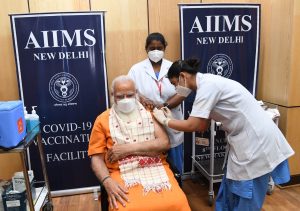India’s prime minister received his second dose of the COVID-19 vaccine as the country hit another peak on April 8 with 126,789 new cases reported in the past 24 hours.
“Vaccination is among the few ways we have to defeat the virus. If you are eligible for the vaccine, get your shot soon,” Prime Minister Narendra Modi tweeted. He received his first vaccine shot on March 1.
India started its vaccination drive in January. So far, more than 90 million health workers and Indians older than 45 have received at least one shot. Only 11 million of them have received both doses as India tries to build immunity to protect its nearly 1.4 billion people.
The new cases reported by the Health Ministry overtook the previous day’s 115,736 infections with dozens of cities and towns imposing night curfews to try to contain infections.
Fatalities rose by 685 in the past 24 hours, the highest since November, raising the nation’s toll to 166,862 dead.
The western state of Maharashtra, the worst hit in the country, accounted for nearly 47 percent of new infections.
The federal government has refused to impose a second nationwide lockdown, after the first last year had a steep economic impact, but it has asked states to decide on imposing local restrictions to contain the spread of the virus.
India now has a seven-day rolling average of more than 80,000 cases per day and has reported 12.9 million virus cases since the pandemic began, the third-highest total after the United States and Brazil.
New Zealand is temporarily halting travel from India as more arrivals from that country test positive for the coronavirus. New Zealand Prime Minister Jacinda Ardern said the suspension takes effect on Sunday and will remain in place until April 28. She said it’s the first time New Zealand has suspended travel for its own citizens attempting to return home, and she emphasized the measure was temporary. The announcement comes after a security guard at a New Zealand quarantine hotel tested positive for the virus. There is no evidence the outbreak has spread any further. New Zealand has managed to stamp out the spread of the virus, so whenever somebody who is not in quarantine tests positive it represents a significant concern.

































